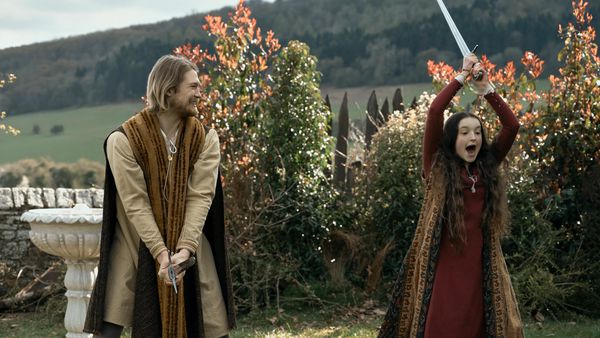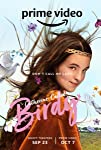Eye For Film >> Movies >> Catherine Called Birdy (2022) Film Review
Catherine Called Birdy
Reviewed by: Jennie Kermode

Bella Ramsey has come a long way in six years, since her first appearance in Game Of Thrones wowed audiences, going on to win her legions of fans. Her starring role in The Worst Witch and her work in His Dark Materials have demonstrated her ability to appeal to teenage audiences, making her the natural choice for this adaptation of Karen Cushman’s best selling book. She slides easily into the role of an ebullient 14-year-old aristocrat living life to the max in Medieval England and resisting all pressure to grow up until the fateful day when she learns that her dissolute father, who has squandered the family fortune, plans to marry her off in an effort to restore it.
If you’re not feeling up to contending with the reality of 14-year-old girls, this won’t be a film for you. Birdy is very full on, full of energy and determined to get her point of view across in a tale originally formatted as a diary. Despite her vigour, she has seen little of the world in the course of her short life, and hasn’t really encountered anyone with a personality as strong as her own, so she expects everything to happen on her own terms, straight away, or else something is seriously wrong. She is not, however, a selfish person. She’s full of love for her family and friends, and incisive enough to be alert to her father’s failings, as well as being deeply worried about the effect on her mother of being constantly pregnant, enduring one dangerous miscarriage after another. This is hardly a good advert for married life, and although initially her parents strive to find her a suitor she will actually like, she is determined to sabotage the enterprise at any cost, finding increasingly creative ways to do so. This provides immediate entertainment for viewers of any age, whilst highlighting to older ones the fact that she is still a child, and thereby emphasising the ugliness of her situation.

Birdy’s railing against the constraints of gender and class will resonate well with modern audiences, but what Cushman did well was to structure it in a way which rings true to the period, and Lena Dunham has stayed true to this approach. Though it may not look like it to the untrained eye, this is one of the more accurate depictions of Medieval England to date. Communities and families – including aristocratic ones – are racially mixed. Food is varied and handsomely presented. Clothes are brightly coloured, in a range of different styles. The stone walls of Birdy’s home are attractively painted and it looks like a home, with all of the clutter of day to day life. It’s easy to understand Birdy’s attachment to these people and places and understand her reluctance to be sent away as, in part, the same reluctance most modern children exhibit when faced with the prospect of moving house.
The film gets beyond the limitations of its young heroine’s perspective by letting us see the behaviour of people around her in ways she can’t, from the peasant boy best friend who is palpably uninterested in girls to the uncle she has a crush on, who is running short on funding for his carefree lifestyle and is ready to make compromises of his own – in the process bringing Birdy into contact with a shrewd middle aged woman who has a different kind of glamour and knows how to use the power which society has afforded her. Everybody here has more going on than we see on the surface, and it is largely through the acting that we gain deeper insights into their lives. Dunham has assembled an impressive cast of actors who are generous with one another and give the natural comedy of the piece room to breathe.
There is a great deal to enjoy here in a fast paced, lively tale which highlights the hypocrisy of its characters without demeaning them, and which is full of heart. Dunham has changed the ending, the most frequently criticised part of the book, to something which still doesn’t quite feel realistic but which makes a lot more sense. She has also made Birdy’s father into less of a boor, presenting uus instead with a man who is weak, careless and easily compromised, but who clearly loves his family. This helps to make all of the characters feel more human, and to put the focus on Birdy as the truly forceful one, emphasising the need for her to grow up and understand that she might sometimes be exerting that force against the wrong people.
Catherine Called Birdy is a film which many adults will find exhausting, but it speaks well to its target audience and, through its depiction of life in the past, finds a good deal to say about teenage life today.
Reviewed on: 19 Dec 2022















